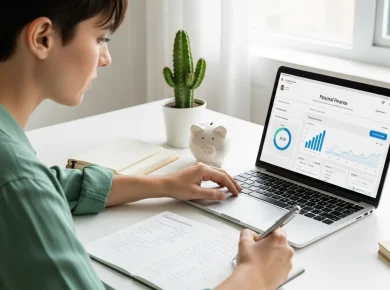Landing your first job is a huge milestone! With that first real paycheck comes a newfound sense of freedom, but also a new set of responsibilities.
Suddenly, you’re thinking about rent, student loans, and maybe even trying to have a little fun without your bank account hitting zero before the next payday. Welcome to the world of personal finance! It might sound intimidating, but managing your money doesn’t have to be complicated. It’s all about building smart, simple habits that can lead to big savings over time. If you’re wondering where to start, you’ve come to the right place. We’ve put together ten practical, no-nonsense tips to help you get started on the right foot.
Master Your Daily Spending Habits
The biggest impact on your budget often comes from the smallest, most frequent decisions you make. By tweaking your daily habits, you can unlock significant savings without feeling like you’re sacrificing everything. It’s about spending smarter, not necessarily spending less.
1. Create a Simple Budget You Can Stick To
You can’t control your money if you don’t know where it’s going. A budget is the most powerful tool in your personal finance arsenal. A great place to start is the 50/30/20 rule: 50% of your after-tax income goes to needs (rent, utilities, groceries), 30% to wants (dining out, hobbies, travel), and 20% to savings and debt repayment. This framework gives you a clear, simple path to follow. For a deeper dive, check out our guide on what is a budget and how to create one.
2. Become Your Own Barista
That daily $5 latte feels like a small treat, but it adds up—fast. We’re talking about $25 a week, $100 a month, or $1,200 a year. Making your coffee at home is a classic money-saving tip for a reason. You don’t have to give it up entirely, but maybe save the fancy coffee shop runs for a once-a-week treat instead of a daily necessity.
3. Embrace Meal Prepping
Lunch is another budget trap. Buying lunch every workday can easily cost you $15 a day. That’s over $300 a month! Dedicate a few hours on Sunday to plan and prep your lunches for the week. It’s not only cheaper but often healthier, giving you more control over what you eat. Think simple: grilled chicken salads, big batches of chili, or pasta dishes that you can portion out.
4. Unsubscribe to Avoid Temptation
Retailers are experts at getting you to spend. Those “24-hour flash sale” emails create a sense of urgency that leads to impulse buys. Do your wallet a favor and hit the “unsubscribe” button on marketing emails from your favorite stores. If you need something, you can always go directly to their website. This small step helps you move from reactive spending to intentional purchasing.
Adopt Smart Strategies for Bigger Savings
Once you have a handle on your daily spending, you can focus on strategies that help your savings grow more consistently. These habits require a little bit of setup but work quietly in the background to improve your financial health.
5. Automate Your Savings
Pay yourself first, and make it automatic. This is one of the most effective personal finance strategies. Set up an automatic transfer from your checking account to your savings account for every payday. Even if it’s just $50 to start, the key is consistency. When the money is out of sight, you’re less likely to spend it, allowing your savings to grow effortlessly.
6. Use the 30-Day Rule for Non-Essential Purchases
See a new gadget or pair of shoes you desperately want? Instead of buying it on the spot, give yourself 30 days. If you still want it just as much after a month has passed, and it fits in your budget, then you can consider buying it. More often than not, you’ll find the initial urge has faded, and you’ve just saved yourself from an unnecessary expense.
7. Regularly Review Your Subscriptions
In the age of streaming services, subscription boxes, and monthly app fees, it’s easy to have “money leaks” you don’t even know about. Once every few months, go through your bank or credit card statements and take inventory of all your recurring charges. Are you still using that fitness app? Do you really need three different video streaming services? Cutting just one or two can free up cash for your savings goals.
Set Yourself Up for Long-Term Success
Good personal finance isn’t just about saving money day-to-day; it’s about building a foundation for your future. These final tips will help you think bigger and plan for the long haul.
8. Understand Your Company Benefits
Your first job offers more than just a salary. Take the time to understand your benefits package, especially a 401(k) retirement plan. If your employer offers a “match,” that’s free money! For example, they might match 100% of your contributions up to 3% of your salary. Contributing enough to get the full match is one of the smartest financial moves you can make.
9. Build a Starter Emergency Fund
Life is unpredictable. A car repair or an unexpected medical bill can derail your budget if you’re not prepared. Your first major savings goal should be to build an emergency fund. Start small by aiming for $500 to $1,000. This cushion will keep you from having to go into debt when surprises pop up. If you want to learn more, see our guide on how to build an emergency fund.
10. Use Financial Tools Wisely
Tools like cash-back apps or rewards credit cards can be beneficial, but only if used correctly. If you get a credit card, treat it like a debit card—don’t charge more than you can pay off in full each month. The high-interest debt from credit cards can quickly erase any rewards you earn. Used responsibly, these tools can put a little money back in your pocket for things you were going to buy anyway.
Getting a handle on your personal finance is a journey, not a race. You don’t need to implement all these tips overnight. Start with one or two that feel most achievable for you. The goal is to build positive momentum and create healthy habits that will serve you well for years to come. By being mindful of your spending and intentional with your savings, you’re taking the first and most important step toward financial well-being.






